How to Handle Common Skin Problems in Chinchillas
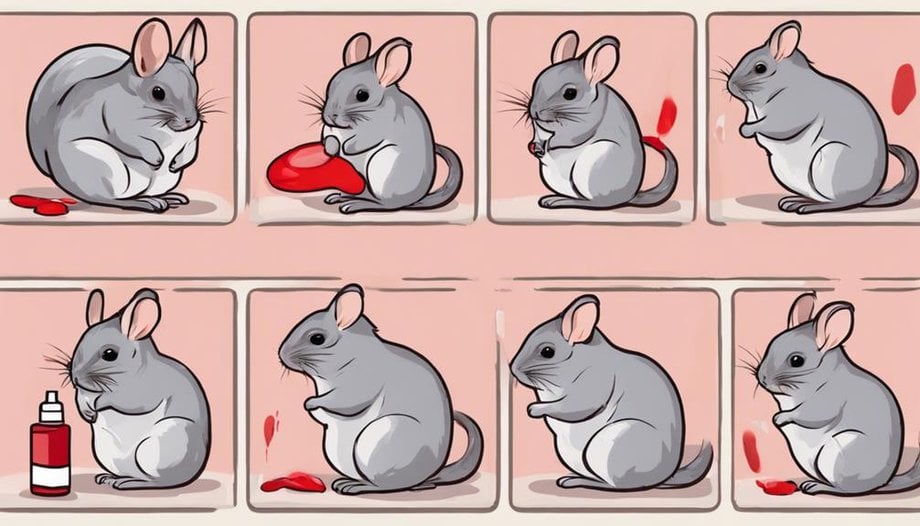
Chinchillas are prone to various skin problems, including fur loss, dry skin, and fur mats. One common issue is fur chewing, which can be caused by stress, boredom, or improper diet. Regular dust baths help maintain their skin health by removing excess oil and dirt. Providing a balanced diet rich in fiber and vitamins is crucial for their overall well-being. If you notice any skin abnormalities, such as redness, inflammation, or sores, it’s essential to seek veterinary care promptly. Maintaining a clean living environment and handling your chinchilla gently can also contribute to their skin health and well-being.
Remember that prevention is key when it comes to skin problems in chinchillas. By following these essential tips and providing proper care, you can help your chinchilla stay healthy and happy.
Recognizing Common Skin Issues
Common skin issues in chinchillas can manifest as fur loss, redness, or flakiness, indicating underlying health concerns that warrant attention. One common problem is skin irritation, which can be caused by a variety of factors such as environmental irritants, improper grooming, or underlying health issues. Chinchillas have delicate skin that can easily become irritated, leading to discomfort and potential complications if not addressed promptly.
To help alleviate skin irritation in chinchillas, monitoring their bathing frequency is crucial. While chinchillas are generally clean animals and don’t require frequent baths, occasional dust baths are essential for maintaining their skin health. Bathing too frequently can strip their skin of natural oils, leading to dryness and irritation. On the other hand, infrequent bathing can result in the buildup of dirt and oils, exacerbating skin problems.
Importance of Proper Hygiene
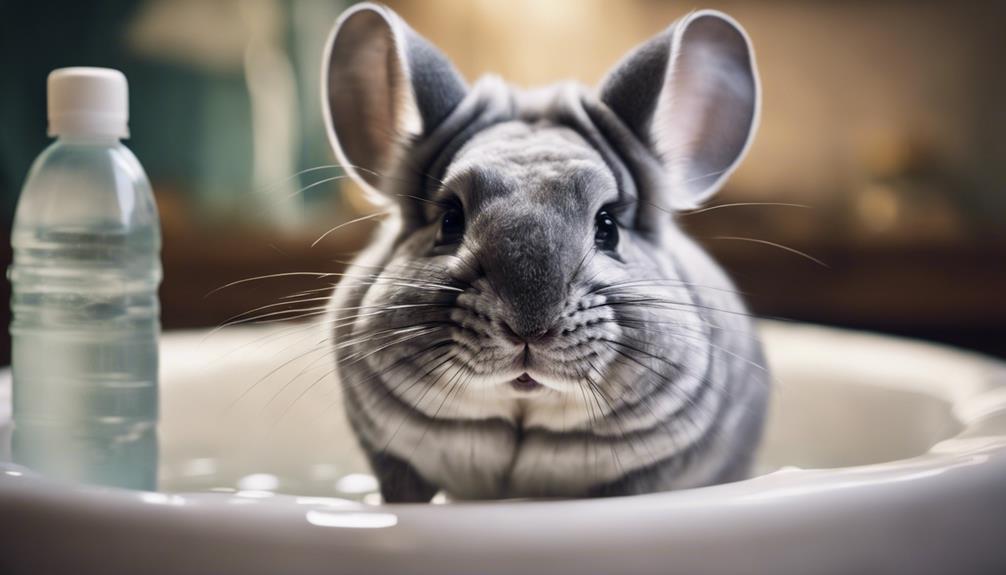
Proper hygiene practices are essential for maintaining the skin health of chinchillas, ensuring they remain free from common skin issues. Regular grooming plays a crucial role in preventing skin problems. Chinchillas should be brushed gently to remove dirt, excess oils, and loose fur. Using appropriate skin care products designed for chinchillas can help maintain their skin’s natural balance. Environmental factors such as excessive humidity or temperature fluctuations can also impact chinchilla skin health. Ensuring a clean living environment and proper ventilation can mitigate these risks.
Additionally, dietary influences are significant. Providing a balanced diet rich in vitamins and minerals supports healthy skin. Preventive measures, like keeping cages clean and dry, are vital in reducing the risk of skin infections. If skin issues arise, seeking veterinary guidance promptly is crucial. Treatment options may include medicated baths, topical ointments, or dietary adjustments. By prioritizing hygiene practices and being attentive to environmental and dietary factors, chinchilla owners can promote optimal skin health in their pets.
Understanding Fur Loss Causes
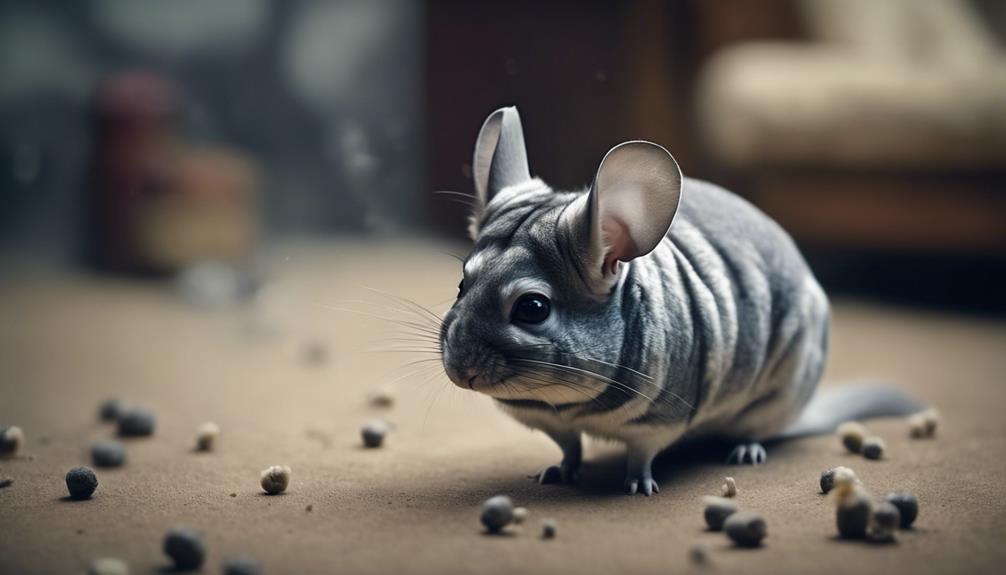
Understanding the underlying causes of fur loss in chinchillas requires a comprehensive assessment of various factors influencing their coat health. Hormonal imbalances can lead to fur loss in chinchillas, affecting their skin and coat condition.
Stress is another significant factor that can trigger fur loss in these small mammals. Genetics plays a crucial role in determining the quality of a chinchilla’s fur, and certain genetic predispositions can make them more prone to experiencing fur loss.
Additionally, environmental factors such as poor diet, inadequate grooming, or living in unsanitary conditions can contribute to fur loss issues in chinchillas. It’s essential to consider all these factors when trying to determine the root cause of fur loss in chinchillas to provide them with the appropriate care and treatment.
Preventing and Treating Fungal Infections
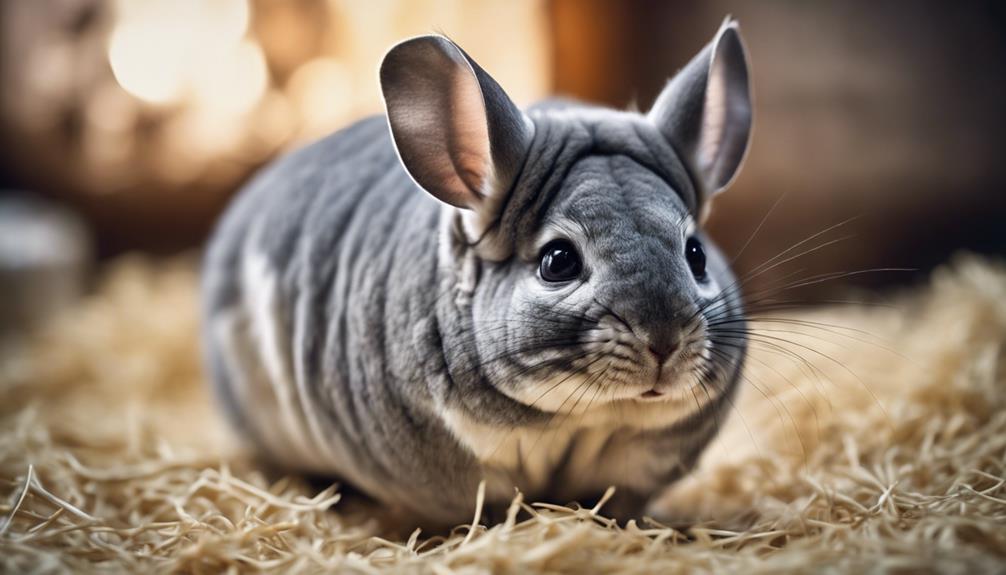
To effectively safeguard chinchillas against fungal infections, diligent hygiene practices and regular health assessments are essential. Preventive measures play a crucial role in maintaining the skin health of chinchillas. Ensuring that their living environment is clean and dry can help prevent fungal spores from thriving. Regularly cleaning and disinfecting cages, providing proper ventilation, and avoiding damp bedding are all vital steps in reducing the risk of fungal infections.
In addition to preventive measures, topical treatments can be used to address fungal infections in chinchillas. Antifungal creams or ointments prescribed by a veterinarian can help eliminate the infection and promote healing. It’s important to follow the veterinarian’s instructions carefully when applying these topical treatments to ensure effectiveness and prevent any potential adverse reactions.
Managing Parasitic Infestations
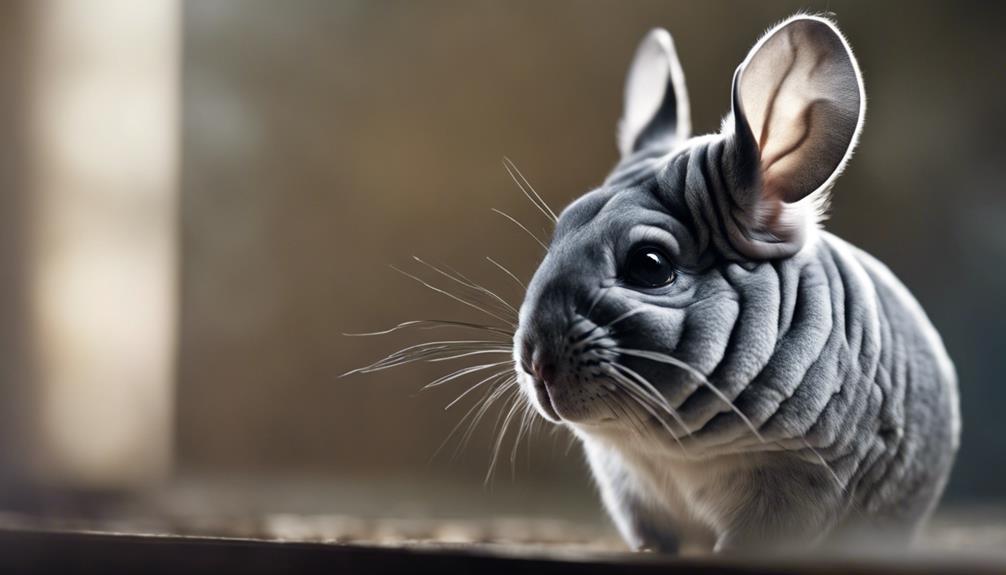
Parasitic infestations in chinchillas require prompt identification and targeted treatment to ensure the well-being of these small mammals. Preventing infestations is crucial to maintaining the health of chinchillas.
- Regular Veterinary Check-ups: Schedule routine check-ups with a specialized veterinarian to detect any potential parasitic issues early on.
- Maintaining Clean Living Conditions: Keep the chinchilla’s habitat clean and dry to minimize the risk of parasites thriving.
- Quarantine New Chinchillas: When introducing a new chinchilla, quarantine them initially to prevent the spread of parasites.
- Use Parasite Preventative Products: Consult with a vet to determine safe and effective parasite prevention products for your chinchilla.
When it comes to treating parasites, it’s essential to follow the veterinarian’s recommendations for medication and care. With proper prevention and treatment measures in place, chinchillas can lead healthy and parasite-free lives.
Dietary Considerations for Skin Health
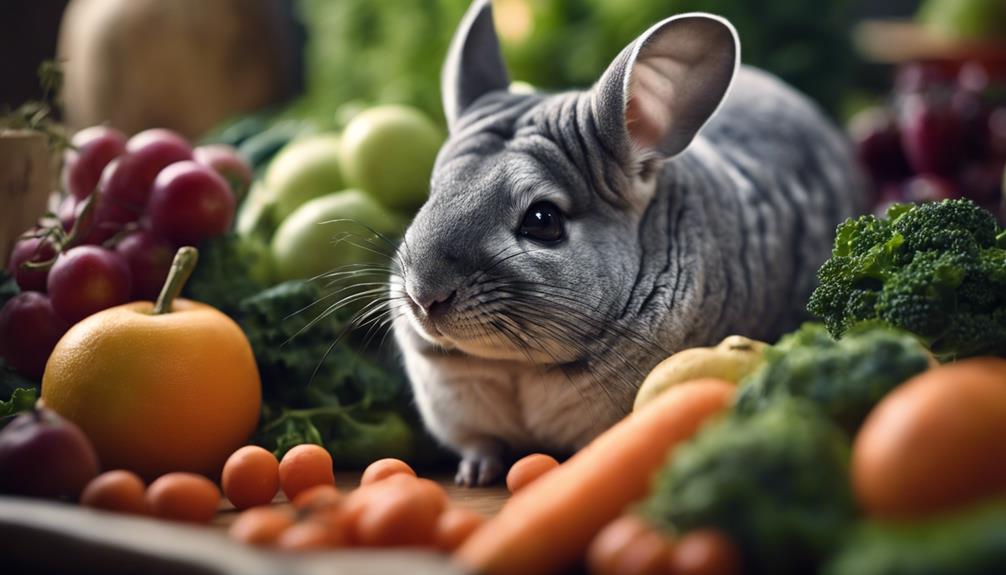
For optimal skin health in chinchillas, incorporating specific nutrients into their diet is essential to support their overall well-being and appearance. Nutritional supplements like vitamin E, omega-3 fatty acids, and biotin can contribute to healthy skin and a shiny coat. Additionally, including skin-friendly foods such as leafy greens, carrots, and blueberries can provide essential vitamins and antioxidants that promote skin health in chinchillas.
| Nutritional Supplements | Skin-Friendly Foods |
|---|---|
| Vitamin E | Leafy greens |
| Omega-3 fatty acids | Carrots |
| Biotin | Blueberries |
Ensuring chinchillas have a balanced diet rich in these nutrients can help prevent common skin problems and maintain a vibrant coat. However, it is important to consult with a vet before introducing any new supplements to your chinchilla’s diet to ensure they are appropriate and safe. By paying attention to their diet and providing the necessary nutrients, chinchilla owners can help their pets achieve optimal skin health and overall well-being.
Consulting a Vet for Skin Problems

When facing skin problems in chinchillas, consulting a vet is crucial due to their expertise in diagnosing and treating such issues.
A prompt visit to the vet is recommended to prevent the problem from worsening.
Vets can provide various treatment options tailored to the specific skin condition of the chinchilla, ensuring proper care and recovery.
Vet Expertise Essential
Seeking veterinary expertise is crucial when dealing with skin problems in chinchillas to ensure accurate diagnosis and appropriate treatment. Professional guidance can significantly improve the well-being of your chinchilla.
When consulting a vet for skin issues, consider the following:
- Specialized Knowledge: Vets have the expertise to identify various skin conditions specific to chinchillas.
- Diagnostic Tools: Vets can use specialized equipment to accurately diagnose skin problems.
- Treatment Options: Vets can recommend suitable treatment plans, including the use of skin conditioners and supplements.
- Preventive Measures: Vets can provide guidance on grooming techniques and tips to prevent future skin issues.
Relying on a veterinarian’s expertise is essential for effectively managing skin problems in chinchillas.
Prompt Vet Visit
Prompt your chinchilla’s veterinary visit at the first sign of any skin problems to ensure timely diagnosis and effective treatment. Early intervention is crucial in addressing skin issues before they escalate. Regular checkups are beneficial for preventing skin problems and catching any issues in their early stages. Below is a table highlighting the importance of prompt vet visits:
| Importance of Prompt Vet Visits | |
|---|---|
| Early Detection | Timely Treatment |
| Prevention | Effective Care |
| Avoid Complications | Ensure Chinchilla’s Well-being |
Vet Treatment Options
Consulting a veterinarian for skin problems in chinchillas provides access to a range of treatment options tailored to address specific issues effectively. Veterinarians may recommend treatments such as:
- Prescription Medications: Antibiotics or antifungal medications may be necessary to treat infections.
- Topical Treatments: Creams, ointments, or sprays can help soothe skin irritations.
- Dietary Changes: Adjusting the chinchilla’s diet to include more vitamins and minerals that promote skin health.
- Surgical Interventions: In severe cases, surgical procedures may be required to address certain skin conditions.
While home remedies and alternative therapies can sometimes be beneficial, consulting a vet is crucial for a proper diagnosis and to ensure the most appropriate treatment is provided for the chinchilla’s skin problems.
Frequently Asked Questions
Can Chinchillas Develop Allergies That Affect Their Skin?
Chinchillas can develop skin allergies, leading to itchiness and irritation. Treatment options include topical creams prescribed by a veterinarian. To prevent skin problems, ensure a clean environment, proper diet, and limited exposure to potential allergens.
Are There Specific Grooming Techniques That Can Help Prevent Skin Issues in Chinchillas?
Regular grooming techniques, akin to tending a delicate garden, can aid in preventing skin issues in chinchillas. Proper care, such as gentle brushing and monitoring for any abnormalities, is crucial in maintaining their skin health.
How Often Should Chinchillas Have Their Cages Cleaned to Maintain Proper Hygiene and Prevent Skin Problems?
Chinchillas should have their cages cleaned every 1-2 weeks to maintain proper hygiene and prevent skin problems. Regular cleaning helps ensure a healthy environment, reducing the risk of skin issues and promoting overall chinchilla health.
Can Chinchillas Develop Skin Issues Due to Environmental Factors, Such as Humidity Levels or Temperature Fluctuations?
Chinchillas can develop skin issues due to environmental stressors like humidity levels or temperature fluctuations. Maintaining optimal conditions is crucial for preventing skin conditions and ensuring good skin health in these small rodents.
Are There Any Natural Remedies or Supplements That Can Help Improve Chinchillas’ Skin Health?
Herbal remedies and supplements can enhance chinchillas’ skin health. Introducing dietary changes rich in vitamins like Vitamin E can promote a healthy coat. Owners should consult a vet for guidance on safe and effective skin care practices.











